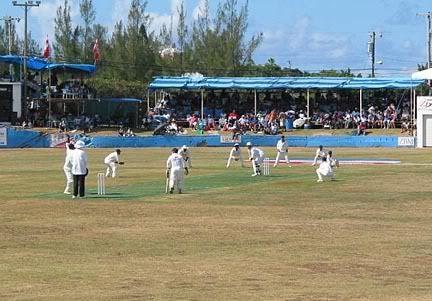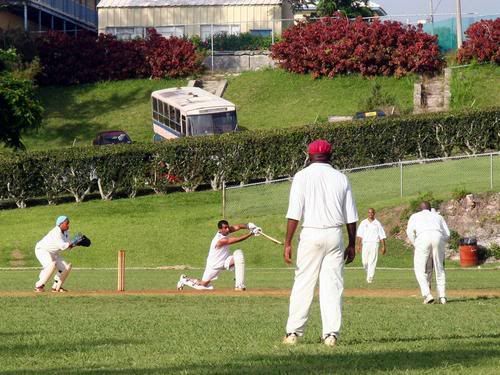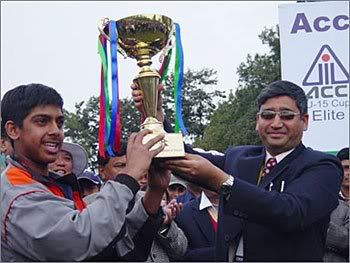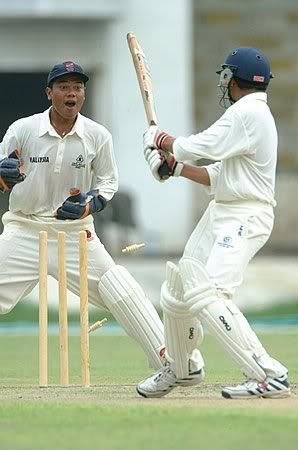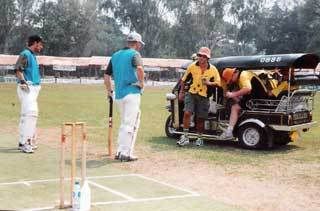
The Kenya national cricket team is the team that represents the country of Kenya in international cricket matches. They are considered one of the strongest of the associate member nations of the International Cricket Council, especially since reaching the semi-final of the 2003 Cricket World Cup. They currently have One Day International status until the 2009 ICC World Cup Qualifier.
Early days:
Kenya's international cricket started in 1951 when regular matches against Tanzania (then Tanganyika) and Uganda began. Touring teams of varying standard continued over the years, including a team of South African Non-Europeans captained by Basil D'Oliviera in 1958. The South Africans won both matches against Kenya on the tour, in addition to a match against East Africa.
East Africa team:
Kenya, Tanzania and Uganda combined to form the East Africa cricket team, which became an associate member of the ICC in 1966. They continued playing amongst themselves, and were joined by Zambia in a quadrangular tournament played annually between 1966 and 1980.
India toured East Africa in 1967 and played a three-day match against Kenya on 5 August, which was drawn. Various tours of, and by, East Africa continued, including a tour of England in 1972 and a first-class match between East Africa and the MCC at Nairobi Gymkhana Club in 1974 before East Africa took part in the first Cricket World Cup.
The 1975 Cricket World Cup took place in England, and East Africa were one of two non-test teams invited to the tournament, the other being Sri Lanka. Kenya provided half of the fourteen man squad for the tournament. After warm-up matches against Somerset, Wales, Glamorgan and various club sides, they played in the same first round group as England, India and New Zealand, losing to all three. The World Cup was followed by a first-class match against Sri Lanka at the County Cricket Ground, Taunton.
East Africa then took part in the 1979 ICC Trophy, the first ICC Trophy tournament, but did not progress beyond the first round, thus missing out on qualification for the 1979 World Cup.
ICC Membership:
Long considered the strongest part of the East Africa team, Kenya broke away in 1981 and joined the ICC in their own right as an associate member, shortly after a tour of Zimbabwe in 1980/81. They played two three-day matches against Zimbabwe on that tour, losing both. Kenya played in the ICC Trophy in their own right in 1982, 1986, and 1990, also playing their first first-class match against Pakistan B in September 1986.
1996 World Cup:
The 1994 ICC Trophy was hosted in Nairobi and Kenya finished as runners-up to the UAE, thus qualifying for the 1996 World Cup. Kenya then played at home against India A in August 1995, and went on a tour to South Africa in September/October that year, before playing in the World Cup, which was to bring Kenyan cricket to a much wider audience, and catapult them into the spotlight.
Kenya were in the same group as Australia, India, Sri Lanka, the West Indies and Zimbabwe. In what at the time was described as the most startling upsets in the history of the World Cup, Kenya bowled out the West Indies for just 93 and won by 73 runs.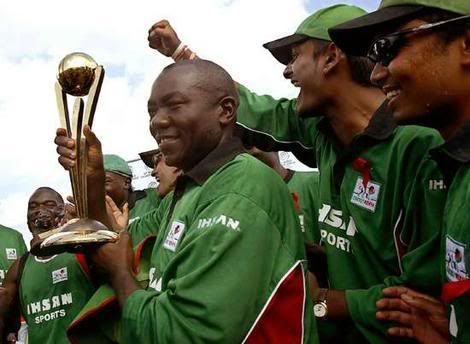
ODI status:
Following their World Cup performance, Kenya were given full ODI status by the ICC, and hosted a quadrangular tournament against Pakistan, South Africa and Sri Lanka in September/October 1996. The Netherlands toured in December, playing four one-day matches, with the Kenyans winning them all. They played in the quarter finals of South Africa's Standard Bank Cup in March 1997, losing to Natal by 104 runs at Kingsmead. Following this was the 1997 ICC Trophy, hosted in Malaysia. Kenya reached the final, where they lost to Bangladesh by two wickets. This was followed by a tri-series against Bangladesh and Zimbabwe in October the same year in Nairobi.
England A were the first opposition in 1998, touring Kenya in January. A three-day match was drawn, with England A winning the only one-day match that was not abandoned due to the weather. After this was another spot in the quarter final of the Standard Bank Cup, this time losing to Gauteng by 8 wickets. Kenya visited India in May, playing a triangular ODI series against Bangladesh and India. In the final match of the round-robin stage, Kenya beat India by 69 runs. Kenya then competed in the cricket tournament at the 1998 Commonwealth Games. Drawn in the same first round group as New Zealand, Pakistan and Scotland, Kenya only beat the Scots, and finished third in the points table for the group.
Kenya warmed up for the 1999 World Cup with a triangular series in Bangladesh against Bangladesh and Zimbabwe. In the 1999 World Cup itself, they were placed in the same first round group as England, India, South Africa, Sri Lanka and Zimbabwe. Following warm-up games against Somerset, Gloucestershire and Glamorgan, they lost all five of their games in the tournament proper. Following the World Cup, they played a quadrangular tournament at home against India, South Africa and Zimbabwe, again losing all their games.
The 21st Century started for Kenya with a visit to Zimbabwe to play in the ICC Emerging Nations Tournament against Denmark, Ireland, the Netherlands, Scotland and Zimbabwe A. Kenya won the tournament and took this form onto a seven match tour of India on which they lost just one game. Pakistan A toured Kenya in July, playing a five match one-day series and a four-day first-class match. The four-day match was drawn, and Kenya won the one-day series 4-1. The 2000 ICC KnockOut Trophy was played in Nairobi in October, with Kenya falling to India at the first hurdle.
The first opponents for Kenya in 2001 were Sri Lanka A, who toured Kenya in January, playing two first-class matches and four one-day matches. Both first-class matches were drawn, and Sri Lanka A won the first two one-day games, with the final two being abandoned. The West Indies came in August for two first-class games and a three match ODI series. The first first-class game was won by the West Indies, with the second being drawn, and the three ODIs all went the way of the visitors. Kenya then played an ODI triangular tournament in South Africa in October, playing against India and the hosts, and picked up a second ODI win over the Indians. Zimbabwe A toured Kenya towards the end of the year, losing a first-class series 1-0 and a one-day series 3-2.
Kenya toured Sri Lanka in early 2002, playing three first-class and three one-day matches against Sri Lanka A. Sri Lanka A won all three of the first-class games, but Kenya won the one-day series 2-1. The MCC toured Kenya shortly after this, playing one three-day match and six one-day matches against the national side. Five of the one-day matches went the way of the Kenyans before the sixth one-day match and the three-day match were abandoned. Kenya then played in the ICC 6 Nations Challenge tournament in Windhoek, Namibia, playing against Canada, Namibia, the Netherlands, Sri Lanka A and Zimbabwe A. Kenya won the tournament, beating Sri Lanka A by 3 wickets in the final. In August/September, Kenya hosted an ODI triangular tournament against Australia and Pakistan, losing all four of their matches. This was followed by a place in the 2002 ICC Champions Trophy, though Kenya lost to the West Indies and South Africa, failing to progress beyond the first round.
Namibia toured Kenya in November, playing four one-day games. Kenya won the series 2-1, with one game being abandoned. Kenya then toured Zimbabwe to round off the year, playing three one-day matches against Zimbabwe A, and a three-match ODI series against the full Zimbabwean side. Zimbabwe won the ODI series 2-0, with one match finishing in a no result, and Zimbabwe A won their series against Kenya 2-1.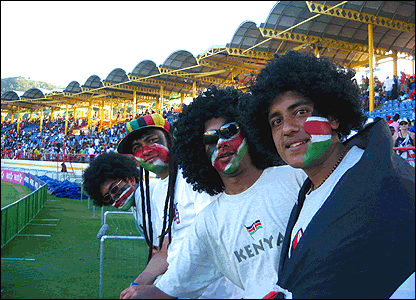
2003 World Cup and decline:
The 2003 Cricket World Cup was to be Kenya's finest moment in international cricket to date. The tournament was to be held in South Africa, with Kenya hosting their two matches against Sri Lanka and New Zealand. The tournament started with a defeat to South Africa, but Kenya bounced back with a four wicket win over Canada in Cape Town. New Zealand forfeited their match against Kenya in Nairobi due to safety concerns, but Sri Lanka did visit Nairobi and lost by 53 runs. The tournament continued, back in South Africa, with a win over Bangladesh and a defeat to the West Indies. Kenya had done enough to qualify for the Super Six stage, becoming the first non-test nation to progress beyond the first round of the World Cup. In the Super Six stage, they lost to India and Australia, but beat Zimbabwe by seven wickets, qualifying for the semi-final, where they lost to India by 91 runs.
Kenya's World Cup success was rewarded with a spot in a quadrangular tournament at the Sharjah Cricket Association Stadium against Pakistan, Sri Lanka and Zimbabwe, but they lost all three of their games.
Kenya's failure in the above tournament is perhaps indicative of how they failed to capitalise on their World Cup success, though it must be said that not all of that failure was on the field. Although Kenya were given plenty of matches against national A sides, and played in the Carib Beer Cup in the West Indies in 2004, Kenya only played two ODIs in the three years after the Sharjah tournament, against India and Pakistan in the 2004 ICC Champions Trophy.
Off-field setbacks also occurred. Maurice Odumbe was banned for match-fixing in August 2004, and a series of strikes by players led to a weakened Kenyan side being eliminated from the inaugural ICC Intercontinental Cup at the semi-final stage by Scotland. By the end of the dispute in 2005, Kenyan cricket had no sponsors and was in virtual international isolation. At that stage the governing body had dissolved internally and Kenyan cricket opportunities were limited and international cricket for them had virtually ceased.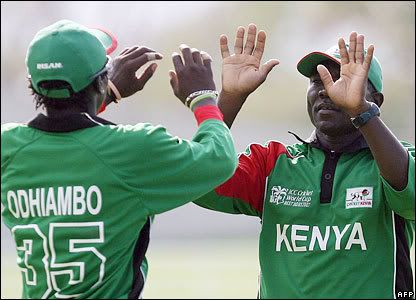
Rebuilding:
A rebuilding process began in 2005. The player strikes ceased, and Kenya again reached the semi-finals of the Intercontinental Cup. They warmed up for the semi-finals in Windhoek with a tour of Zimbabwe, to play two first-class and one one-day match against Zimbabwe A. They won all three of those games, and drew against Bermuda in the semi-final of the 2005 ICC Intercontinental Cup but lost to Ireland in the final, despite scoring 404/4 in their first innings.
In early 2006, the Kenya Cricket Association was disbanded and replaced by Cricket Kenya. The rebuilding process was in full swing as Kenya began playing ODI cricket again. Their return to ODI cricket was a five match series against Zimbabwe, which was drawn 2-2 with one match abandoned. This was followed by a four match ODI series against Bangladesh, with Kenya losing all four matches in that series. Their 2006 ICC Intercontinental Cup campaign got off to a poor start with a draw against the Netherlands and a defeat to Canada, but they bounced right back with two ODI wins over Canada at the Toronto Cricket, Skating and Curling Club. Bangladesh toured Kenya in August, winning all three ODIs, before an Intercontinental Cup draw against Bermuda and three ODI wins over Bermuda.
A triangular tournament in Mombasa against Canada and Scotland began Kenya's 2007 and Kenya won the tournament. They then hosted Division One of the World Cricket League at three grounds in Nairobi, playing against Bermuda, Canada, Ireland, the Netherlands and Scotland. Kenya also won this event, beating Scotland in the final. This was followed by the 2007 World Cup, Kenya's fourth World Cup. Kenya beat Canada in the first round, but lost to England and New Zealand, thus missing out on the Super Eight stage.
In October 2007, either side of Intercontinental Cup games, Kenya hosted Canada and then Bermuda in ODIs. Kenya won five straight matches, with strong bowling performances setting up relatively comfortable chases batting second.
In August 2008, after a break of 9 months without an One Day or Twenty20 International, Kenya toured Ireland, Scotland and the Netherlands for various series. Rain and poor Kenyan batting performances were the main theme and overall it was a disappointing tour for Kenya.
Kenya initially participated in the 2009 ICC World Twenty20 Qualifier in Belfast, Northern Ireland, the associate qualification tournament for the 2009 ICC World Twenty20. One of the favourites at the start of the tournament, Kenya finished second in Group B with a loss to the Netherlands and a win over Canada, before crashing out at the knock out stage to finish fourth with losses to Ireland and Scotland and Kenya failed to qualify for the 2009 ICC World Twenty20.
Following the Twenty20 tournament Kenya participated in three ODI series across Europe. Kenya had two ODI wash outs against Scotland, before losing a rain affected one off match to the Netherlands and a three match series 1-0 to Ireland with two matches affected by rain.
Since the World Cup, a team known as Kenya Select has taken part in Zimbabwe's Logan Cup competition, but did not win a game, also losing to Zimbabwe A.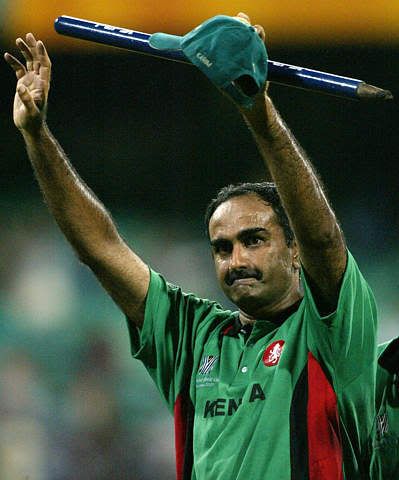
*Acknowledgements to Wikipedia.com, owners of pictures and videos used.

